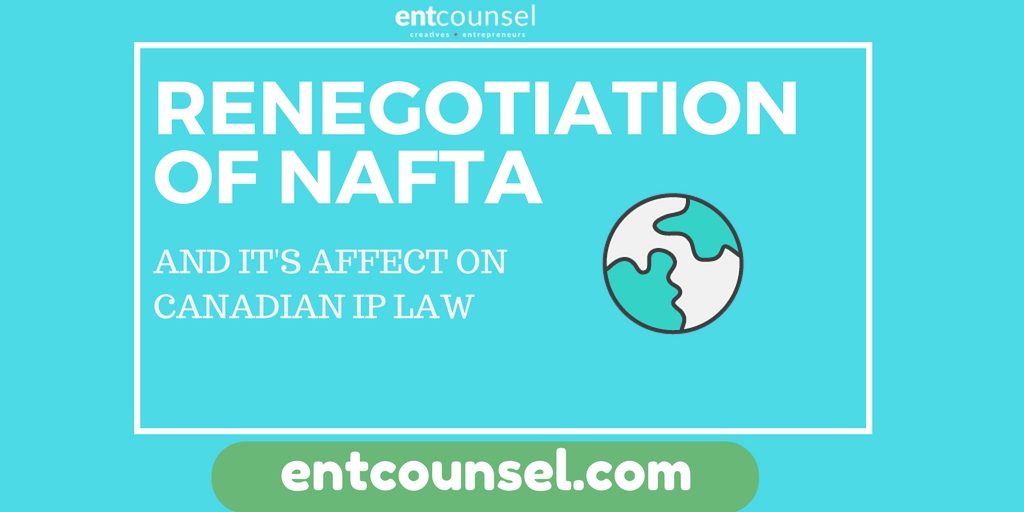NAFTA Renegotiation
The US gave notice to Canada and Mexico on May 18, 2017, that it wished to for a NAFTA renegotiation including the provisions on intellectual property rights. A summary of the US Objectives can be found in a blog article I wrote on Red Points. The US Objectives would strengthen intellectual property protection and require Canada and Mexico to change its law.
The two main US Objectives that would impact intellectual property law in Canada as a result of the NAFTA renegotiation are discussed below. Ensuring provisions governing intellectual property rights reflect a standard of protection similar to that found in U.S. law.
US Objectives on Intellectual Property Rights in NAFTA Renegotiation
The US Objectives in the NAFTA renegotiation propose that provisions governing intellectual property rights of the other member states be similar to those found in the U.S. law. This brings a higher onus of intellectual property protection and exceeds the current NAFTA regime of only requiring national treatment.
These include the notice and takedown procedure for online infringement and extending the term of copyright for Canada to life plus 70 years from the current international standard of life plus 50 years.
1) Impact on Canada of US Copyright Provisions – Notice and Takedown (DMCA)
While Canada would likely not have an issue with many of the US Objectives in the NAFTA renegotiation regarding intellectual property, Canada may have a dispute with adopting the US notice and takedown system for copyright enforcement which is more aggressive than Canada’s current äóìnotice and noticeäó system.
A copyright infringement online can be reported pursuant to the Digital Millennium Copyright Act (DMCA) in the US or through the Notice and Notice procedure in Canada. The DMCA incorporated two 1996 WIPO treaties and was passed in 1998.It addresses copyright infringement online through Title II, it’s Online Copyright Infringement Liability Limitation Act.
A copyright owner can provide notice to an internet service provider (ISP) of a copyright violation who then must forward it to the website owner. The website owner must take the infringing work down. The online service has a safe harbour and is not liable for the infringement provided they comply with the DMCA notice and takedown regime. The website owner, in turn, may provide a counter-notice and which point, the entity complaining of the infringement must bring a lawsuit within a certain period of time. Otherwise, the infringing content is put back up.
In Canada, the notice and notice protections for ISPs are set forth in section 41,25, 41, 26 and 41,27(3) of the Copyright Modernization Act. In Canada, while the ISPs are legally required to pass notices of alleged infringement to the website owner, there is no requirement to actually take the work down as in the US. A copyright owner needs a court order to learn the identity of the website owner. It can then pursue legal proceedings for copyright infringement. The US will undoubtedly want Canada to change its current system to be more in line with the US which will only serve to bring greater protection to intellectual property owners and strengthen the process even more. Read our article on the significant changes to Canada’s Copyright Act.
2) Copyright Term in Canada vs. US
In general, Canada’s copyright term of protection of life plus 50 years is shorter than the US copyright term of life plus 70 years. The US notice and takedown regime provides stronger protection than Canada’s notice and notice system.
There is no doubt that if Canada were to bring some aspects of their intellectual property laws more in line with the US, it would bringer stronger intellectual protection but certainly deviates from NAFTA’s current obligations of providing national treatment.
3) Criminal Penalties for Circumventing Digital Locks
The US Objectives if implemented would result in increased criminal penalties and damage awards. The criminal penalties provisions would require Canada to change digital lock rules which cover rights management information and technological protection measures. The criminal penalties provision would require a change in Canada’s current law that protects Canadians from statutory or significant damages for circumventions for private purposes (such as circumventing the digital locks on private DVD collections).
Provide strong standards enforcement of intellectual property rights, including by requiring accessible, expeditious, and effective civil, administrative, and criminal enforcement mechanisms.
It is also argued that such increased protection for technological protection or digital locks could conflict with some data that is in the public domain. The NAFTA negotiations pursuit of further protections for IP without providing exceptions may prevent access to data when it’s appropriate.
Canada already prohibits devices and software to break technological protection measures but adding significant penalties would become problematic.
Conclusions on NAFTA Renegotiation
While some of the proposed changes to NAFTA regarding intellectual property provisions are definitely positive and would create a stronger intellectual property regime internationally, others such as those pertaining to criminal sanctions and damages for circumventing digital locks would be onerous.



